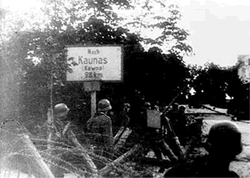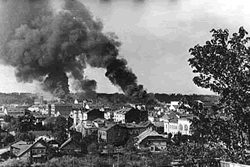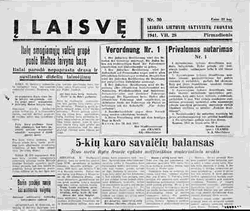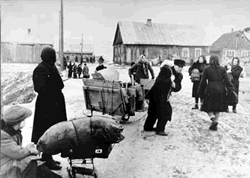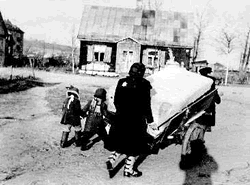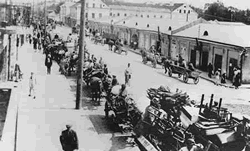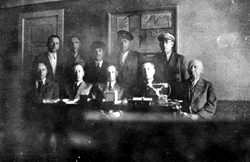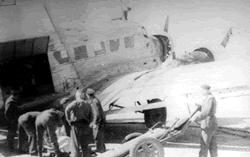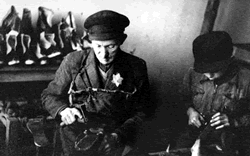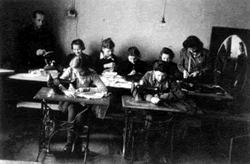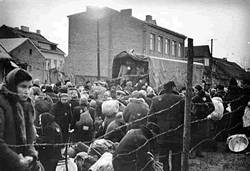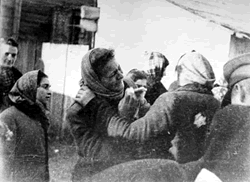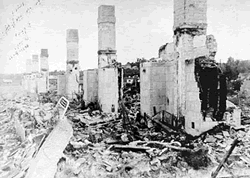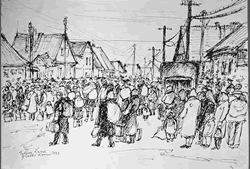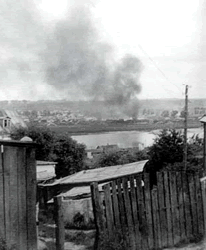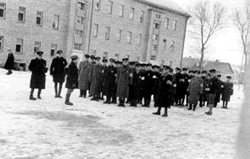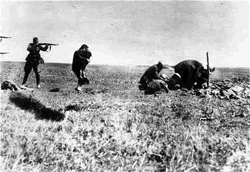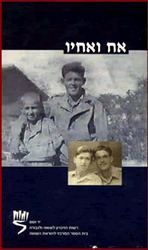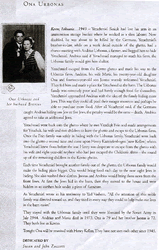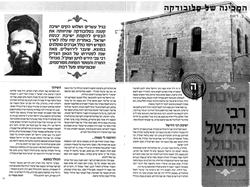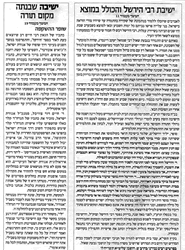|
|
| Kovno Home Page |
|
Kovno
Stories and Links
|
|
|
| Memoir: The Holocaust Recalled |
| First
World War.com - Memoirs & Diaries - The Fall of Kovno |
|
|
|
|
|
|
|
|
|
|
|
|
|
|
|
|
|
|
|
|
|
|
| How
I Survived the Kovno Ghetto |
| Rabbi
Ephraim Oshry |
| Reb
Shraga Frank and his wife, Rivka |
Elul
in Slabodka: From the Diary of Rabbi Avrohom Eliyahu Kaplan zt"l
Rabbi Yosef Gavriel Bechhofer |
| Shulamit
Rabinovitch |
| Rabbi
Yitzchok Eizek Sher |
| HaRav
Elizer Menachem Mann Shach (1895- 2001) |
| Rabbi
Chaim Leib Shmulevitz: by Eliahu Meir Klugman |
| Rav
Meir Halevi Chodosh, ZT"L |
| The
Kovno Ghetto Orchestra (1943-1944) |
| Rabbi
Yechezkel Sarna |
| Rav
Moshe Mordechai Epstein by D. Sofer |
| Rabbi
Tobias Geffen |
| Zippora-Nehama-Safira: A Family Odyssey By Yvette Nahmia-Messinas |
| In Slobodker Yeshiva by Falk Zolf |
| Kovno looms over Slobodka by Falk Zolf |
| The Song is Interrupted by Falk Zolf |
| The World in Flames by Falk Zolf |
| The Kravetz Family |
| With a Rifle in My Hand and Eretz Yisrael in My Heart |
| The Musical family Stupel/ Hofmekler |
| Raja Schiff Shlom-nee Berkman |
| Dr. Moshe Langman |
| Testimony of Zvi - Hirsch Griliches |
| Testimony of Meri Michelson |
| Moisei Kopelman, former police chief of the Kovno ghetto |
| Fania Brantsovskaya |
| Prof. Uriel Leviatan - Biography in Hebrew |
| An Early Childhood Molded by the Holocaust |
| The Shulman Family of the Slabodka Yeshiva |
| Emmanuel Levinas (1906-1995) |
| The Story of Yehuda Feigin |
| SHAPIRO, AVRAHAM DUBER KAHANE |
| Rabbi Avraham Dovber Shapira, son of Zalman Sender Kahana Shapira |
|
|
|
|
|
|
|
|
|
|
|
|
|
|
|
|
|
| ABRAHAM MAPU |
| Ludvic Lazarus (Ludwik Lejzer, Ludwik Łazarz) Zamenhof |
| Miriam Ben-Porat |
| Rabbi Yechezkel Sarna (1890 - 1969) |
In the Anti-Nazi Underground of the Kovno Ghetto
The Craving for Resistance and its Realization
By: Prof. Dov Levin, Jerusalem 2005 |
| In Those Days by Herzl Ben-Yehuda |
| Marcia Spies |
|
|
|
|
|
|
|
|
|
|
|
|
|
Yehezkel Pularevich, Nachum Maryash, Shmariyahu Pustapetsky and Abraham Rohman,
Zionists from Kovno |
| Moshe Baram |
| Lea Goldberg (1911-1970) |
| The Jews of Kovno |
| Lithuanian Hypocrisy |
| The Story of Ephraim Gruzin |
| Lina Beresin of Kovno |
| The Music of Partisans of Vilna |
| Music in the Kovno Ghetto and Lithuania |
| Ziwa Alexander Katz, Holocaust survivor |
| The Holocaust in Lithuania, and Its Obfuscation, in Lithuanian Sources |
| Father Bronius Paukstys and his brother Juozas |
| Rabbi Eliezer Simcha Rabinowitz |
| Moshe Arnes |
| Major General Sidney Shachnow |
| Dr. Israel Isidor Elyashev |
| Dr. Joel Brotzkos |
| Tzemach Feldstein |
| Instead of Truth about the Holocaust – Myths about Saving Jews |
| Shmuel Yitzchak Hillman |
| "Mi'yarkete Tsafon" ("From the Ends of the Earth") - memoirs of Gitta Langleben-Klibansky |
| Echoes from a silent past |
| Eyewitness Meyshke Preys (Misha Preisas): Kovno (Kaunas), 23 June 1941 |
| Tzemach Ben Zvi Feldstein |
| Ben Zion Black of Kovno |
| Shalom (Sholik) Kaplan (later Eilati) |
| Wisgardisky |
| The Brutskus/Bruckus Family |
| Bronislava Krištopavi?ien? Righteous Among the Nations |
| Meir Tobianski |
| Boris Schatz (1866–1932) |
| Julius Berman Remembers Uri Chanoch |
| The Cohen Family |
| The Chanoch Family |
| TOBIJAS JAFETAS'S STORY |
| Hermann Kallenbach |
| A first letter from a survivor; Dr. Nachum Levitan |
| Samuel Sadinsky, Dad loved Science & lived like he worked - committed to doing his best |
| Mystery pre-Holocaust photo trove turns out to be of family of US scholars |
| Avraham Tory nee Golub |
| The Varsavskis Family Album |
| MAY 7 1942: PREGNANCY AS A DEATH SENTENCE IN THE KOVNO GHETTO |
| Lithuania: Cemetery Work in Kaunas |
| The Elkes Family |
| Interview with Holocaust Survivor Shalom Eilati |
| Israel Kaplan and his wife Lea Greenstein |
| Shlomith Frieda Flaum 1893-1963 |
| Notes by Ted Ashkenazy |
| The Virovitch Ginas Family |
| Yosef Achai (nee Sukastalisky- Kafkafi) |
| |
|
|
|
Click
on Photos to Enlarge
|
|
|
|
ksl-#1:
German troops advance towards Kovno. The sign in the photograph
reads, Kaunas (Kovno), 98 kilometers.Credit: Lithuanian Photographic
and Video Archives
click to read the Introduction http://www.ushmm.org/kovno/intro/intro.htm
|
ksl-#2:
Smoke from German shelling billows over the city of Kovno, June
22-25, 1941. Credit: George Kadish, photographer, Beit Hatefutsoth,
Israel
click to read the story of the Invasion http://www.ushmm.org/kovno/invade/invade.htm
|
|
|
|
ksl-#3:
Order #1" as printed
in the Lithuanian Activist Front newspaper I
Laisve [To freedom], July 28, 1941. Credit: Lithuanian Central
State
Archives, Vilnius
[translation]
Order No. 1
1. The Jewish population is not allowed to walk on the sidewalk.
Jews
are to walk single file on the right side of the street.
2. The Jewish population is not allowed walk on the promenades
and are
not allowed in any public parks. Likewise, the Jewish population
is
not allowed to sit on public benches.
3. The Jewish population is not allowed to use any public
transportation such as taxis, coaches, buses, boats, and similar
vehicles of transportation. The proprietors and owners of all
public
vehicles of transportation must post a visible notice on the vehicle
stating: "Jews Not Permitted."
4. Any violations
of these orders will be severely punished.
5. These orders are to be enforced as of today. SA-Colonel Hans
Cramer, City Commissioner
|
ksl-#4:
Moving into the Kovno ghetto. Credit: George Kadish, photographer,
George Kadish, Florida
|
|
|
|
|
ksl-#5:
Moving into the Kovno ghetto. Credit: George Kadish, photographer,
Beth Hatefutsoth, Tel Aviv, Israel
|
ksl-#6:
Carts loaded with the possessions of Kovno's Jews head towards the
bridge to Slobodka while empty carts return to the city, July-August,
1941. Credit: Avraham and Pnina Tory, Israel
to read about it go to;
Ghettoization
http://www.ushmm.org/kovno/ghetto/ghetto.htm
|
|
|
|
ksl-#7:
The Jewish Council. Chairman Elkes is seated third from left, and
Vice-Chairman Leib Garfunkel is to his far right.Credit: Avraham
and Pnina Tory, Israel. Photograph by George Kadish, Beth Hatefutsoth,
Israel
Inside the Ghetto -- Jewish Council to read about it click;
http://www.ushmm.org/kovno/council/photo2.htm
|
ksl-#8:
Jewish laborers at the Aleksotas airfield. Credit:YIVO
|
|
|
|
|
ksl-#9:
The shoe-making workshop. Credit: Abrahm and Pnina Tory, Israel
|
|
|
|
|
|
ksl-#11:Final
Days
On October 26, 1943, the SS deported 2,709 persons from the ghetto.
Those deemed fit for work were sent to harsh labor camps in northern
Estonia, while children and the elderly were deported to Auschwitz.
Few survived.Credit: George Kadish, Florida
|
ksl-#12:
Kovno ghetto Jews during
the Estonian Deportations, October 1943. Credit: George Kadish,
Florida
|
|
|
|
ksl-#13:
The ruins of Kovno
Ghetto.Credit: George Kadish, photographer
|
ksl-#14:
George Kadish, lorida
Esther Lurie, Deportation to a Labor Camp
pen and ink, 1943.Credit: Esther Lurie, Israel
|
|
|
|
ksl-#15:
Kovno ghetto in flames.Credit:
George Kadish, photographer; Beth Hatefutsoth, Israel
|
ksl-#16:
Final muster of the
Jewish Police before they were taken to Fort IX.Credit: George
kadish, photographer, Beth Hatefutsoth, Israel
In an effort to obtain information about the ghetto's underground
and about the locations of hidden bunkers, the Gestapo arrested
and tortured some 130 Jewish policemen at Fort IX. 36 men are
killed after refusing to cooperate, including Police Chief Moshe
Levin and his assistants, Joshua Greenberg and Yehuda Zupowitz.
For the rest go to;
http://www.ushmm.org/kovno/real/final.htm
|
|
|
|
ksl-#17:
Mass Murder Einsatzgruppe
member kills a Jewish woman and her child near Ivangorod, Ukraine.
1942. Credit: Jerzy Tomaszewski, Poland
Mobile killing units (Einsatzgruppen) followed the German army
during its invasion of the Baltics and the western Soviet Union,
first killing Jewish men, Soviet political commissars, and others
considered racially or politically dispensable. Months after the
invasion, Mobile killing units turned to the execution of women
and children. Open air killings continued in areas of eastern
Europe during 1942 and by the spring of 1943, Einstagruppen units
A-D had killed over million persons. ....
For the rest go to;
http://www.ushmm.org/kovno/mass/photo.htm
|
|
|
| ksl-#19: Yaakov Shalom Svirski
Jakob Svirsky was born in Kowna, Lithuania in 1920 to Zalman and
Khaia Rivka. He was a student in the university and single. Prior to
WWII he lived in Kowna, Lithuania. During the war was in Kowna,
Lithuania. Jakob perished in Kowna, Lithuania on his birthday of 21 in
August of 1941. This information is based on a Page of Testimony
submitted on 03/10/1956 by his sister Dvora
for more details ( in Hebrew) go to Link
|
ksl-#20:The story of Uri and Dani Chanoch ( in Hebrew)
Link
|
|
|
|
ksl-#22:
Story of Yerachmiel Siniuk and Yitzchak Fein who were saved by the Urbanas Family
|
|
|
ksl-#23:
TOBIJAS JAFETAS AND CLASSMATES (PICTURE BELOW TAKEN IN 1939)
http://www.centropa.org/photo/tobijas-jafetas-and-classmates
This is the 4th grade of the Jewish elementary school where I studied. I am in the center, 2nd row, my friend Zandel is beside me. The 2nd on the left in the 2nd row is Tanur, Soloveichik is beside her, unfortunately, I don't remember their first names. I don't remember any other names. The photo was taken in Kaunas in 1939.
I went to the preparatory class at the gymnasium where my brother Azriel also studied. Jews constituted about 30% of the total population of Kaunas, and there were several Jewish schools there: a Yiddish Jewish school, the technical Jewish gymnasium, the humanitarian gymnasium and a religious school. In my gymnasium the subjects were taught in Hebrew. Soon I started talking to my parents and my brother in Hebrew. I had Jewish friends. One of them, Zandel, was my classmate and so were the girls Tanur and Soloveichik. These were their last names; unfortunately, I don't remember their first names. Regretfully, our communication didn't last long. Zandel and Tanur perished during the occupation, and Soloveichik and her family were deported to Siberia. I don't know what happened to her. I also played with other children of different nationalities, and we got along very well.
There were many Jewish organizations in Kaunas. I liked performances of the Jewish theater where we went with my class. I liked music and liked listening to the records my father played on the record player. I started learning to play the piano, when I was about five years old. We had a piano delivered from Germany. I didn't like playing it but preferred playing with my friends and Lev. I played table tennis for some time. There were Jewish organizations in Lithuania and in Kaunas. I didn't like Betar members, who I thought were too aggressive. Maccabi and Hashomer Hatzair were closer to me. There was another organization in Kaunas, which collected money to purchase land in Palestine, and for the construction of kibbutz communities and establishment of the Jewish state. There was a nice money box, where Mama and Papa always dropped change, in our living room. Every week a representative of this organization visited us. We opened the 'cannon' and he collected the money.
Tobijas Jafetas
YEAR OF BIRTH: 1930
CITY OF BIRTH: Kaunas
COUNTRY NAME AT TIME OF BIRTH: Lithuania
OCCUPATION
AFTER WW II: Teacher of physics, mathematics
|
ksl-#24:
Levitan Story (Hebrew)
|
|
|
|
|
| |
|
|
|
|
| |
| |
|
|
|
|
| |
| |
| |
| |
|
|
